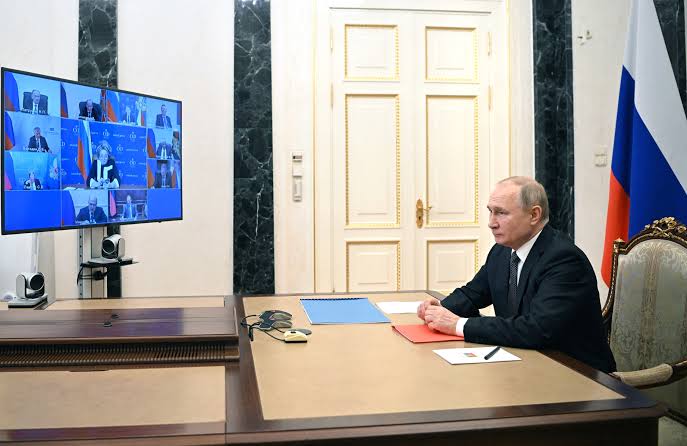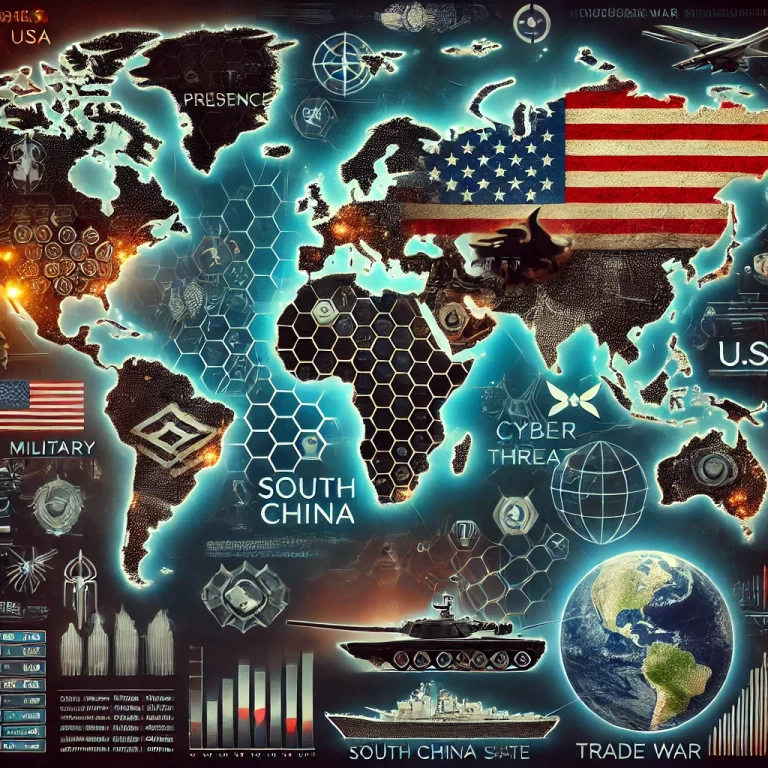
Nuclear Drills and Fifth Term: What Does Putin Want?
The ongoing conflict with Ukraine has been a major point of contention between Russia and the West, with accusations of Russian aggression and territorial expansion. By conducting military exercises involving nuclear weapons, Putin sends a strong message to both Ukraine and the international community
The timing of Russia’s announcement of military exercises involving nuclear weapons training alongside President Vladimir Putin’s fifth term in office raises questions about whether these events are part of a calculated strategy by Putin. The ongoing conflict with Ukraine adds complexity to the situation.
Putin’s return to power for a fifth term signifies his continued dominance in Russian politics and his ability to maintain control over the country’s military and foreign policies. This, coupled with the announcement of nuclear weapons training exercises, suggests a deliberate move by Putin to assert Russia’s military might and reinforce its global power status.
The ongoing conflict with Ukraine has been a major point of contention between Russia and the West, with accusations of Russian aggression and territorial expansion. By conducting military exercises involving nuclear weapons, Putin sends a strong message to both Ukraine and the international community, asserting Russia’s military capabilities and its willingness to defend its interests.
Putin’s return to power for a fifth term signifies his continued dominance in Russian politics and his ability to maintain control over the country’s military and foreign policies.
Russia-Ukraine Relationship: From History to Current Conflict
The relationship between Russia and Ukraine has been turbulent, stemming from historical tensions and ongoing disagreements. Ukraine has a long history of Russian influence, from imperial control to Soviet rule. After gaining independence in 1991, Ukraine’s strategic importance led to heightened competition with Russia.
The conflict escalated in 2014 when Russia annexed Crimea, a region with a significant Russian-speaking population and strategic importance due to its access to the Black Sea. The annexation was widely condemned by the international community, leading to economic sanctions against Russia. This move marked a turning point in the relationship between Russia and Ukraine, deepening the divide between the two nations.
The divergence in political and economic paths, with Ukraine seeking closer ties to the EU and democratic reforms, further fueled tensions. The ongoing hostilities in eastern Ukraine, particularly in the Donbass region, have led to loss of life and displacement.
Russia’s Military Exercises and Nuclear Weapons Training
Russia’s military exercises and nuclear weapons training serve multiple objectives. Firstly, they are aimed at maintaining the readiness and preparedness of Russia’s armed forces. By conducting these drills, Russia seeks to enhance its military capabilities, test its defense systems, and ensure the effectiveness of its strategic deterrent.
The inclusion of tactical nuclear weapons training in these exercises is a reflection of Russia’s doctrine of “escalate to de-escalate.” This doctrine suggests that in a scenario where Russia perceives an existential threat to its security, the use of limited nuclear weapons could deter further aggression and force a de-escalation from the adversary.
Under Putin’s leadership, Russia has conducted numerous military exercises to showcase its capabilities and test its readiness. These exercises involve large-scale maneuvers with participation from various branches of the armed forces.
One notable example is the Vostok 2018 exercise, held in September 2018. With around 300,000 troops participating, it was one of the largest military exercises in Russia’s history. The objective was to demonstrate Russia’s ability to mobilize and coordinate its forces on a massive scale. Joint operations with the Chinese military also highlighted Russia’s growing partnerships.
These military exercises serve multiple purposes. Firstly, they demonstrate Russia’s military strength and capabilities to the international community, projecting power and deterring potential adversaries. Secondly, they allow Russia to test readiness and identify areas for improvement in tactics, equipment, and command structure.
Russia conducts regular training exercises to ensure the readiness and effectiveness of its nuclear forces. These exercises involve testing the deployment and delivery systems of nuclear weapons, simulating launches from different platforms such as land-based silos, submarines, and strategic bombers.
Implications for Russia and the Ongoing Conflict in Ukraine
The ongoing conflict in Ukraine and its implications for Russia have had significant effects on both countries and the wider international community. Here are some key points to consider:
Economic Impact: Western sanctions have greatly affected Russia’s economy, leading to a decline in foreign trade and economic growth. The IMF estimates that these sanctions have cost Russia around 1.5% of its GDP per year.
Geopolitical Consequences: Russia’s actions, including the annexation of Crimea and continued involvement in the conflict, have strained its relations with the international community. Russia was expelled from the Council of Europe after 26 years of membership.
Military Losses: Russia has suffered significant military losses, impacting its capabilities. Western trade restrictions on microchips have hindered Russia’s ability to replace these losses.
International Sanctions: The international community has imposed sanctions on Russia, targeting various sectors of its economy and assets of wealthy individuals, limiting its access to international markets.
Humanitarian Crisis: The conflict has resulted in a significant humanitarian crisis, with thousands killed and hundreds of thousands displaced. Civilian infrastructure has been damaged, exacerbating the suffering of the Ukrainian people.
International Relations: The conflict has strained Russia’s relations with other countries, particularly in the Western world, and raised questions about the future of transatlantic relations.
Regional Security: Concerns about regional security and stability have prompted a reevaluation of security arrangements in Europe, exposing vulnerabilities in countries with ties to Russia and Ukraine.
Ukraine’s Desire to Join NATO
Ukraine’s desire to join NATO is driven by several key factors. Firstly, it sees NATO membership as a way to assert its sovereignty and independence, distancing itself from Russian influence.
Secondly, NATO membership offers Ukraine a greater level of security and protection. It has faced ongoing territorial disputes and aggression from Russia, such as the annexation of Crimea in 2014. Joining NATO would provide Ukraine with collective defense mechanisms and military support, enhancing its ability to deter aggression and protect its territory.
Furthermore, NATO membership would provide Ukraine with access to intelligence sharing, military training, and modern military equipment, strengthening its defense capabilities. This is particularly important given the ongoing conflict with Russia and the need to modernize its armed forces.
Lastly, NATO membership holds the promise of greater economic cooperation and integration with the West, attracting foreign investment and contributing to Ukraine’s economic development.
Russia conducts regular training exercises to ensure the readiness and effectiveness of its nuclear forces. These exercises involve testing the deployment and delivery systems of nuclear weapons, simulating launches from different platforms such as land-based silos, submarines, and strategic bombers.
Russia’s Opposition to Ukraine’s NATO Aspirations
Russia strongly opposes Ukraine’s desire to join NATO due to several reasons. Firstly, it views NATO’s expansion into Eastern Europe as a threat to its regional dominance and security interests. Ukraine’s potential NATO membership would further erode its perceived influence.
Moreover, Russia considers Ukraine joining NATO as a strategic setback and a challenge to its security. It fears NATO forces on its border and worries that NATO’s collective defense commitment could draw the alliance into a conflict with Russia.
Additionally, Russia has historically regarded Ukraine as part of its sphere of influence. Ukraine’s alignment with the West and pursuit of NATO membership is seen as a betrayal and an attempt by the West to undermine Russia’s position.
Russia has taken active measures to prevent Ukraine from joining NATO, including military aggression, support for separatist forces in eastern Ukraine, and the annexation of Crimea. These actions have strained relations between Russia and NATO, heightening tensions in the region.
Putin’s 5th Term and Its Impact on the USA and China
United States Perspective:
The United States views Putin’s continued leadership with caution, seeing it as a challenge to its global influence. Putin’s assertive foreign policy has reshaped power dynamics, evidenced by tensions like Edward Snowden’s seeking refuge in Russia in 2013 due to his leaking classified NSA (National Security Agency) documents, straining US-Russia relations. Snowden, a former NSA contractor, leaked classified documents revealing mass surveillance programs, leading him to seek asylum in Russia to evade prosecution in the US. The US perceives Russia’s alignment with China as a threat to its interests and the Western-led international order.
China Perspective:
China sees Putin’s continued leadership as an opportunity to strengthen its strategic partnership with Russia and challenge US hegemony. China and Russia have expanded trade and defense ties over the past decade, driven by their shared desire to curb American power. China views Russia’s alignment as a means to challenge the Western-led international order and increase its own influence.
The United States views Putin’s 5th term with caution and sees Russia’s alignment with China as a challenge to its global influence. China, on the other hand, sees Putin’s continued leadership as an opportunity to strengthen its strategic partnership with Russia and challenge US hegemony.
Conclusion
Finding a viable path forward amidst Putin’s power dynamics, Russia’s military maneuvers, and the Ukraine conflict requires diplomatic engagement, de-escalation efforts, and addressing root causes.
Diplomatic engagement involves meaningful dialogue, trust-building, and exploring compromises. De-escalation efforts entail refraining from provocations and reducing military activities. Addressing root causes involves governance, minority rights, and economic development in Ukraine.
Cooperation between Russia and Western nations is crucial, focusing on shared challenges like counterterrorism and climate change. Reinforcing international norms, such as sovereignty and non-interference, is vital for stability.
A collaborative, inclusive approach prioritizing diplomacy and mutual respect is essential for lasting peace and prosperity in the region.
____________________________________________
Aric Jabari is a Sixteenth Council Fellow



